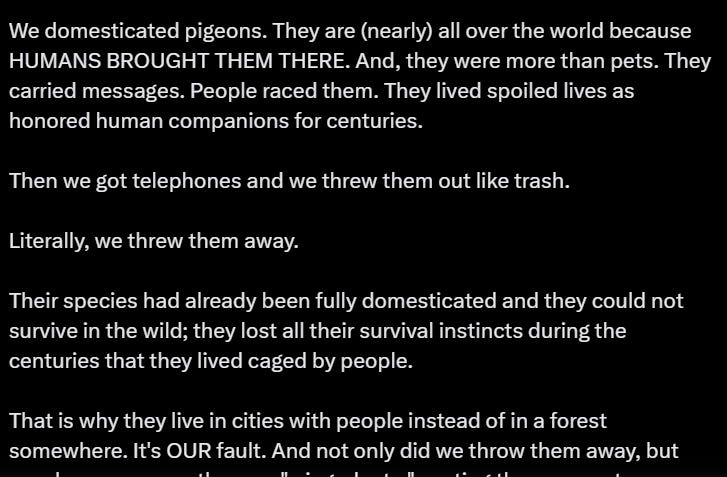The other day, as I stared out of an office in central Glasgow, my eyes fell on a group of pigeons fluttering over each other as they competed for space on a window ledge. I don’t normally notice pigeons, but the way these birds tumbled over each other on the wall drew my eye. The sash window was wide open, but despite their chaotic movement the pigeons assiduously respected the division of inside/outside. Eventually someone inside the building noticed the crowd and closed the window only half-way, leaving a gap about half the height of a pigeon - less a shutting out than an asserting of the boundary, trusting the pigeons to understand and respect it. I can’t think of many other animals you would be so complacent about. Lots of people have experienced a pigeon coming inside, and we know they can cause a lot of mess. Nonetheless, we’re not really worried about them. I think this lack of concern can be chalked up to familiarity, but it also betrays the complete lack of respect that leads us to consider pigeons completely harmless - even when we know that if they came into our space with enough energy they could at least ruin our morning.
Pigeons are mostly ignored. In an urban context, if you notice them at all it’s usually because they’re annoying you. When I was a kid, my grandparents lived right on the edge of Plymouth, next to the woods, and often I’d hear a bird cooing in the morning. It was such an intriguing sound, wild, strong yet open. Sometimes it kept me from my lie-in, and in that way it was annoying, but in a wholly different way to the street pigeons who tangle themselves in my feet. This was a pigeon among the trees in its own world, far above the pigeon urchins trying to get by in the gutters of ours. I think this Plymouth pigeon would’ve been a wood pigeon, an entirely different species from the urban feral pigeons, the descendents of domesticated rock doves turned out on the streets.
This is a point often made by the pigeon sympathisers - the pigeons that live in our towns are so comfortable around us because we created them, and then decided we no longer needed them. To denounce them as dirty “rats with wings” is to double down on this cruelty. We should tolerate them as an act of pity, re-learn how to cohabit with them, maybe even try to rekindle the relationship we severed when we unilaterally dumped them. This is all very noble, but it smells more of paternalistic guilt than genuine respect. It raises the question, do pigeons really need saving?
When I was doing some Googling for this post, I came across this Snopes article “debunking” a tweet (what am I doing?) from one of these would-be saviours:
The good people at Snopes could tell this netizen meant well, and awarded him a “Mostly True”. However when I do my own fact-checking, there are more than a few holes in his narrative. For one thing, it’s pretty hard to justify the idea that pigeons have no survival instincts - they’re everywhere! But more crucially, he paints the pigeon’s urbanisation as a terrible exile from the forest, the place they’d much rather be. This is a misunderstanding of the pigeon’s true nature, for as mentioned above the ancestor of the feral pigeon is the rock dove, who avoid woodland in favour of rocky cliffs and outcrops. They aren’t trapped in town, it’s where they want to be!
The Urban Cliff Hypothesis is the idea that human settlements replicate the cave environments our neolithic ancestors once dwelt in, and the species that inhabited those cliff ecosystems have moved into cities with us. The urban environment is diverse, and the origins of most of its inhabitants unclear, but pigeons are one species we can prove have been with us for tens of thousands of years. The city is the pigeon’s natural environment on a massive scale, it’s where they want to be. This doesn’t change the pigeon’s status as a pest, but it does raise them from the position of ‘unfortunate victim’. Without this understanding of why pigeon’s live where we live, I fear we’ll never understand each other. They might be nice to look at, or incredibly annoying, but regardless of how we feel about them, they are here. Pigeons are an important reminder that we cohabit the urban environment, and other species are going to have a stake in it, whether we welcome them or not. In that spirit, it’s nice to look at the window and see our non-human neighbours doing their own thing.





look up ‘IP over avian carriers’ - it started as sort of a joke but there was in idea to use it in Gaza about 10 years ago as the Israeli settler state control their internet access. pigeons are us and we are pigeons - we do to them as we do to ourselves!
Thank you. I have enjoyed reading through these. Have you listened to the Worm From Home podcast? https://www.patreon.com/posts/intro-102482732